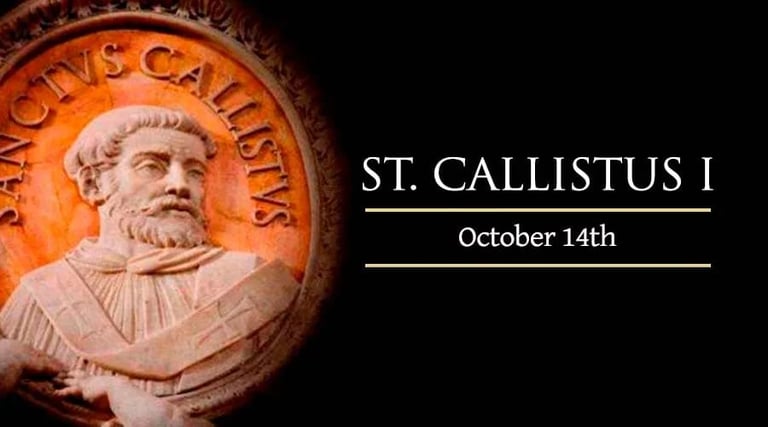Saint of the day October 14, 2024
St. Callistus I
DAILY SAINT
Nirmala Josephine
10/14/20243 min read


Pope Callistus I is celebrated in churches throughout the world as a saint and martyr on October 14. The saint caused a major controversy, including a schism that lasted almost two decades, by emphasizing God's mercy in his ministry. However, the early Pope's model of leadership has endured, and his martyrdom in the year 222 confirmed his example of holiness.
Because no completely trustworthy biography of Pope Callistus I exists, historians have been forced to rely on an account by his contemporary Hippolytus of Rome. Although Hippolytus himself was eventually reconciled to the Church and canonized as a martyr, he vocally opposed the pontificate of Callistus and three of his successors, to the point of usurping papal prerogatives for himself (as the first “antipope”). Nevertheless, his account of Callistus' life and papacy provides important details.
According to Hippolytus' account, Callistus – whose year of birth is not known - began his career as a highly-placed domestic servant, eventually taking responsibility for his master's banking business. When the bank failed, Callistus received the blame, and attempted to flee from his master. Being discovered, he was demoted to serve as a manual laborer in Rome. Thus, under inauspicious circumstances, Callistus came as a slave to the city where he would later serve as Pope.
Matters went from bad to worse when he was sent to work in the mines, possibly for causing a public disturbance, if Hippolytus' account is to be trusted. However, Callistus may also simply have been sentenced due to a persecution of Christians, as he was among the many believers eventually freed on the initiative of Pope St. Victor I.
During the subsequent reign of Pope Zephyrinus, Callistus became a deacon and the caretaker of a major Roman Christian cemetery (which still bears his name as the “Cemetery of St. Callistus”), in addition to advising the Pope on theological controversies of the day. He was a natural candidate to follow Zephyrinus, when the latter died in 219.
Hippolytus, an erudite Roman theologian, accused Pope Callistus of sympathizing with heretics and resented the new Pope's clarification that even the most serious sins could be absolved after sincere confession. The Pope's assertion of divine mercy also scandalized the North African Christian polemicist, Tertullian, already in schism from the Church in Carthage, who also erroneously held that certain sins were too serious to be forgiven through confession.
Considered in light of this error, Hippolytus' catalog of sins allegedly “permitted” by Callistus – including extramarital sex and early forms of contraception - may in fact represent offenses that the Pope never allowed, but which he was willing to absolve in the case of penitents seeking reconciliation with the Church.
Even so, Callistus could not persuade Hippolytus' followers of his rightful authority as Pope during his own lifetime. The Catholic Church, however, has always acknowledged the orthodoxy and holiness of Pope St. Callistus I, particularly since the time of his martyrdom – traditionally ascribed to an anti-Christian mob - in 222.
St. Callistus' intercession after death may also have made possible the historic reconciliation between his opponent Hippolytus, and the later Pope Pontian. The Pope and former antipope were martyred together in 236, and both were subsequently canonized.
Reflection
It has been said of Saint Callistus that if we knew more about his life from Christian sources, he might have gone down as one of our greatest popes. He suffered greatly in his early life but entered the service of the Church where he became a deacon and then pope. He taught about the importance of penance, evangelized, faced calumny and persecution with courage, and died for his faith. What little we know of his life remains an inspiration today, and his merciful commitment to repentant sinners shines forth as the law of Christ and the ongoing practice of the Church.
As we honor this ancient pope, ponder your own approach to mercy. Mercy is two-sided. We need to be convinced of God’s mercy toward us, and we need to show that same depth of mercy toward others. Pray to Saint Callistus today for a merciful and courageous heart so that you will follow in his footsteps.
